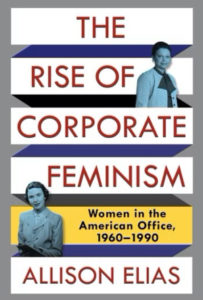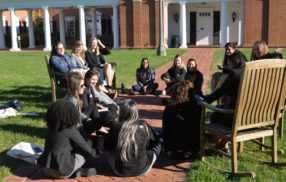
New Book From UVA Darden Professor Explores ‘Corporate Feminism’ and Economic Inequality
From the 1960s through the 1990s, the most common job for women in the United States was clerical work. Even as college-educated women obtained greater opportunities for career advancement, occupational segregation by gender remained entrenched. How did feminism in corporate America come to represent the individual success of the executive woman and not the collective success of the secretary?
In a new book, The Rise of Corporate Feminism: Women in the American Office, 1960-1990 (Columbia University Press, 2022) University of Virginia Darden School of Business Professor Allison Elias argues that feminist goals of advancing equal opportunity and promoting meritocracy unintentionally undercut the status and prospects of so-called “pink-collar” workers.
 The book, at the intersection of history and management studies, charts the trajectory of modern feminism at work, following the political, legal, societal and cultural changes that influenced the nature of secretarial work from 1960 to 1990. Elias contends that the most visible messages of feminism regarding individual merit and sex equality undercut the status of the occupation, downgrading any feminized prestige that secretaries once enjoyed.
The book, at the intersection of history and management studies, charts the trajectory of modern feminism at work, following the political, legal, societal and cultural changes that influenced the nature of secretarial work from 1960 to 1990. Elias contends that the most visible messages of feminism regarding individual merit and sex equality undercut the status of the occupation, downgrading any feminized prestige that secretaries once enjoyed.
“The advancement of women in the workplace has been steady but uneven, with proposed solutions and paths often tailored to specific groups or demographics,” said Elias. “The book explores the manner in which occupational categories have been a constraining factor for advancement, especially during times of tremendous social change.”
MORE: Women at Work — Past, Present and Future
The Rise of Corporate Feminism considers changes in the workplace surrounding affirmative action, human resource management, automation and unionization. The book spotlights the secretaries, clerks, receptionists, typists, and bookkeepers whose career trajectories remained remarkably similar despite sweeping social and legal change.
A professor in the Communication area at Darden, Elias teaches courses including “Leadership Communications,” “Negotiations,” and the new elective “Women, Gender and Work.”
Her paper “Business Schools and the Role of Executive Wives” was published by the Academy of Management in 2021. Read a Q&A with Elias on Darden Ideas to Action.
The University of Virginia Darden School of Business prepares responsible global leaders through unparalleled transformational learning experiences. Darden’s graduate degree programs (MBA, MSBA and Ph.D.) and Executive Education & Lifelong Learning programs offered by the Darden School Foundation set the stage for a lifetime of career advancement and impact. Darden’s top-ranked faculty, renowned for teaching excellence, inspires and shapes modern business leadership worldwide through research, thought leadership and business publishing. Darden has Grounds in Charlottesville, Virginia, and the Washington, D.C., area and a global community that includes 18,000 alumni in 90 countries. Darden was established in 1955 at the University of Virginia, a top public university founded by Thomas Jefferson in 1819 in Charlottesville, Virginia.
Press Contact
Molly Mitchell
Associate Director of Content Marketing and Social Media
Darden School of Business
University of Virginia
MitchellM@darden.virginia.edu






